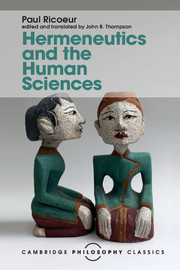Book contents
- Frontmatter
- Contents
- Preface to this edition
- Acknowledgements
- Editor's introduction
- Notes on editing and translating
- A response by Paul Ricoeur
- Part I Studies in the history of hermeneutics
- Part II Studies in the theory of interpretation
- Part III Studies in the philosophy of social science
- Select bibliography
- Index
A response by Paul Ricoeur
Published online by Cambridge University Press: 05 July 2016
- Frontmatter
- Contents
- Preface to this edition
- Acknowledgements
- Editor's introduction
- Notes on editing and translating
- A response by Paul Ricoeur
- Part I Studies in the history of hermeneutics
- Part II Studies in the theory of interpretation
- Part III Studies in the philosophy of social science
- Select bibliography
- Index
Summary
I should like, in this brief foreword, to express my gratitude to John Thompson for the considerable work which the translation of my essays represents. I am in complete agreement with his choice of terms for rendering French or German expressions that have no equivalents, either in the British philosophical tradition or even in the English language. Of course, there is always a point at which a translation becomes an interpretation; but Thompson has ensured continuity and coherence in his choices. He has thus provided an English translation of my essays which is as readable as it is exact.
I should also like to express my interest in the analysis which he offers, in his substantial introduction, of the development of my work from 1947 until the earliest articles in this collection, none of which date from before 1970. The perspective which he proposes corrects the inverse impression, to which I have a tendency to succumb: that of a certain lack of continuity in my writings. For each work responds to a determinate challenge, and what connects it to its predecessors seems to me to be less the steady development of a unique project than the acknowledgement of a residue left over by the previous work, a residue which gives rise in turn to a new challenge.
The first challenge was that represented by the apparent incapacity of Husserlian phenomenology to deal with volitional experience, since the privilege of theoretical consciousness and perception seemed so much to dominate, to the point of saturating, the descriptive field opened up by the analysis of intentionality; had not Merleau-Ponty as well written a phenomenology of perception? Could one write a phenomenology of the will without abandoning the method of describing the essential structures of consciousness? Freedom and Nature attempted to respond to this challenge.
However, the residue left by the analysis was considerable. On the one hand, a gap appeared between the intended meaning of freedom of the will and the various limitations attested to by the involuntary – a disproportion which seemed to have no parallel in the sphere of theoretical consciousness, even if one emphasised, more than Merleau-Ponty had done, the gap between the conceptual meaning of language and the corporeal condition of perception.
- Type
- Chapter
- Information
- Hermeneutics and the Human SciencesEssays on Language, Action and Interpretation, pp. xlii - lPublisher: Cambridge University PressPrint publication year: 2016
- 2
- Cited by



